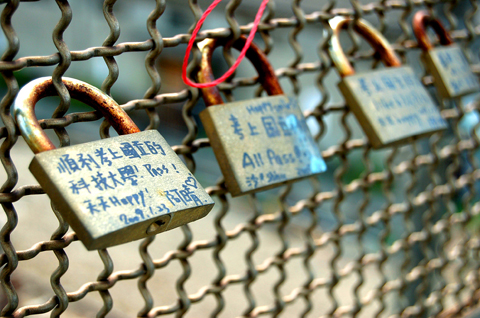Residents of Fengyuan (豐原), Taichung County, are making wishes by hanging padlocks on a wire mesh fence at a pedestrian overpass by the city’s train station.
Train station director Lin Ching-shan (林景山) said that despite the fact that overpasses exist at many train stations around the country, to his knowledge, this phenomenon is unique to Fengyuan.
It all began about five years ago when someone observed a few padlocks hanging on the fence with wishes written on them in Chinese and an unidentified foreign language, he said. Before long, the padlocks were known as “wish locks.”

PHOTO: CHANG JUI-CHEN, TAIPEI TIMES
Lin said some people believe the trains generate a magnetic field when they pass under the overpass and the energy that accumulates in the locks will fulfill their wishes. Although authorities have cleared the fence on several occasions, new padlocks keep turning up, Lin said.
The wishes written on the padlocks include: “[I wish to] successfully pass university entrance exams,” “I want happiness” and “[give me] eternal love.”
Sometimes two padlocks are locked together or hung close to each other. These are known as “heart locks,” and are normally hung by lovers.
One lock hung by someone looking for a partner had the wish “Be with me!” written on it. Other examples are “I want money” and “[Let’s] go to National Taiwan University together. We want to move in together.”
The overpass in Fengyuan has attracted students from all over Taiwan, who go to read the padlocks, developing into a youth tourist spot, Lin said.
Folklore specialist Chang Yi-ming (張益銘) said the phenomenon may be an imitation of youth subcultures developed from faith practices in other countries, adding that a magnetic field would imply that the place has a lot of energy.
Whether that energy is beneficial or not is for people to decide on their own, he said.

A preclearance service to facilitate entry for people traveling to select airports in Japan would be available from Thursday next week to Feb. 25 at Taiwan Taoyuan International Airport, Taoyuan International Airport Corp (TIAC) said on Tuesday. The service was first made available to Taiwanese travelers throughout the winter vacation of 2024 and during the Lunar New Year holiday. In addition to flights to the Japanese cities of Hakodate, Asahikawa, Akita, Sendai, Niigata, Okayama, Takamatsu, Kumamoto and Kagoshima, the service would be available to travelers to Kobe and Oita. The service can be accessed by passengers of 15 flight routes operated by

Chinese spouse and influencer Guan Guan’s (關關) residency permit has been revoked for repeatedly posting pro-China videos that threaten national security, the National Immigration Agency confirmed today. Guan Guan has said many controversial statements in her videos posted to Douyin (抖音), including “the red flag will soon be painted all over Taiwan” and “Taiwan is an inseparable part of China,” and expressing hope for expedited reunification. The agency last year received multiple reports alleging that Guan Guan had advocated for armed reunification. After verifying the reports, the agency last month issued a notice requiring her to appear and explain her actions. Guan

GIVE AND TAKE: Blood demand continues to rise each year, while fewer young donors are available due to the nation’s falling birthrate, a doctor said Blood donors can redeem points earned from donations to obtain limited edition Formosan black bear travel mugs, the Kaohsiung Blood Center said yesterday, as it announced a goal of stocking 20,000 units of blood prior to the Lunar New Year. The last month of the lunar year is National Blood Donation Month, when local centers seek to stockpile blood for use during the Lunar New Year holiday. The blood demand in southern Taiwan — including Tainan and Kaohsiung, as well as Chiayi, Pingtung, Penghu and Taitung counties — is about 2,000 units per day, the center said. The donation campaign aims to boost

The Central Weather Administration (CWA) said a magnitude 4.9 earthquake that struck off the coast of eastern Taiwan yesterday was an independent event and part of a stress-adjustment process. The earthquake occurred at 4:47pm, with its epicenter at sea about 45.4km south of Yilan County Hall at a depth of 5.9km, the CWA said. The quake's intensity, which gauges the actual effects of a temblor, was highest in several townships in Yilan and neighboring Hualien County, where it measured 4 on Taiwan's seven-tier intensity scale, the CWA said. Lin Po-yu (林柏佑), a division chief at the CWA's Seismological Center, told a news conference